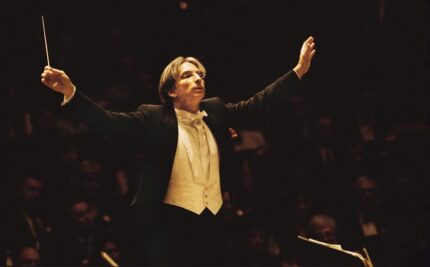“Oedipus” rules! CSO, Tilson Thomas serve up a memorable night of Stravinsky

For the second and final week of his Chicago Symphony Orchestra stand, Michael Tilson Thomas served up an envelope-pushing all-Stravinsky program Thursday night that stayed away from the Russian composer’s greatest hits in favor of his Neo-Classical rarities.
Few 20th-century composer’s stylistic shifts had the seismic significance of Stravinsky’s turn away from Romanticism toward Neo-Classicism. Like Richard Strauss’s about-face toward the Mozartian romantic charm of Rosenkavalier after Salome and Elektra, and Sibelius stepping back from the brink after his desolate Fourth Symphony, Stravinsky’s move toward a leaner, stripped-down idiom reflected the times, but also marked a personal desire to shear off excess and get his music down to essentials, as reflected in the two main works heard at Orchestra Hall.
Though Oedipus Rex was conceived by Stravinsky and librettist Jean Cocteau as an opera, the lack of dramatic incident in their consciously didactic, un-theatrical treatment—as with the distancing Latin text—makes it more of an oratorio, and that’s how it was presented Thursday night. The singers were situated on a raised platform behind the orchestra, making it clear that the non-vocal element was primus inter pares.
Yet if the action is stiff and non-linear, even with bridging narration in the vernacular, Stravinsky’s vocal writing has a showy brilliance that is clearly operatic in its high-flying demands.

Along with Mahler and Tchaikovsky, Stravinsky is prime fare for Tilson Thomas. Under the conductor’s tautly focused direction, the CSO, men of the CSO Chorus and an inspired team of soloists delivered a resounding and clarion performance of Oedipus Rex that made for one of the finest nights of the season.
Tenor William Burden—a memorable Alwa in Berg’s Lulu last season at the Lyric Opera—assayed the punishing lines and coloratura flights to give an involving account of the tormented Oedipus, with a lieder-like sensitivity in his closing scene.
Back for her second CSO assignment in as many months, Michelle DeYoung as Jocasta looked aptly regal and imperious in her gold gown and sang with firm tone and expressive point. Young bass-baritone Ryan McKinny made an impressive CSO debut in a variety of roles, handling the twisting challenges of Tiresias with aplomb. Tenor Stanford Olsen provided worthy support in the smaller role of the Shepherd.
Discreetly amplified, Sir Patrick Stewart brought Shakesperean grandeur and a wide range of expression and subtlety to the narration. The men of the Chicago Symphony Orchestra Chorus provided imposing ferocity and polish to their prominent role.
Holding it all together was Tilson Thomas who drew responsive bravura playing from the CSO in a performance that brought out all of the astringent ceremony, brassy audacity, ingenuity and wry satire (you have to love those loopy woodwinds as Jocasta inveighs against the oracles).
Composed virtually simultaneously with Oedipus Rex was the ballet Apollon musagete or Apollo. The lean, tableaux-like choreography put the young George Balanchine on the map, and this score remains one of Stravinsky’s finest and most individual achievements.
Stravinsky shears his resources down to just 34 strings, yet the invention, subtlety and expressive range of this restrained, luminous score are remarkable. While Apollo remains a cornerstone of Stravinsky’s Neo-Classical period, the inspirations are many: the cool elegance of the French Baroque, a wry Mozartian wit, even Tchaikovsky’s Serenade for Strings, yet the end result is distinctively and delightfully Stravinsky.
It’s astounding that this important score has not been played by the CSO in 27 years. On that occasion, Tilson Thomas was the conductor, and Thursday night he again showed his Stravinskian mastery with a beautifully textured and uncommonly vital performance.
Purists may quibble that MTT’s enriching the resources to 50 strings made for a more richly upholstered sonority than Stravinsky wanted, but it’s hard to argue with the results. The conductor elicited refined, transparent playing that conveyed this score’s myriad beauties and intricacy, the Classical poise as well as the ars antiche charm, in a performance that was finely detailed but flowing and non-pedantic. The CSO strings were at their considerable best rendering this music with a wondrous purity, with stylish solo contributions by concertmaster Robert Chen and assistant principal cellist Kenneth Olsen.
The evening led off with Stravinsky’s Ode, heard in its belated CSO premiere. Commissioned to mark the passing of Natalie Koussevitzky, the Ode strikes only a fleeting elegiac tone in the bustling opening Eulogy, the valedictory element more touchingly manifest in the concluding Epitaph. Yet it is the contrasting central Eclogue that contains the most striking music. Mining recycled music from a film score for an abandoned Jane Eyre film project, Stravinsky’s brilliant wind writing with its lively contrapuntal hunt motif was delightful, played with fine, nimble elan by the four CSO horns.
The program will be repeated 1:30 p.m. Friday, 8 p.m. Saturday, and 3 p.m. Sunday. www.cso.org; 312-294-3000.
Posted in Uncategorized





